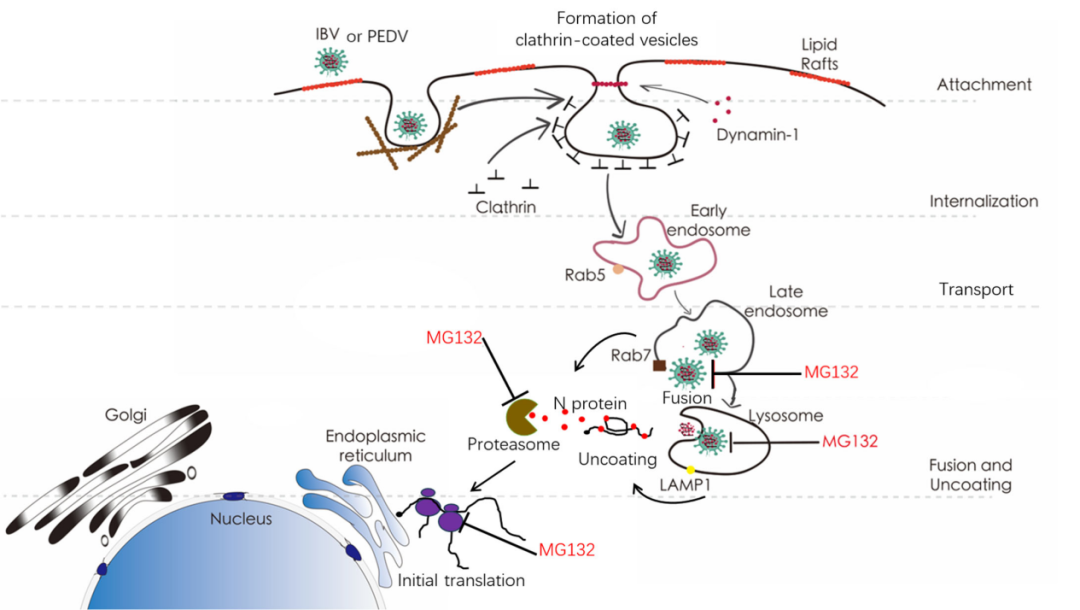
Recently, the Poultry Virus Disease Monitoring, Early Warning and Prevention and Control Team of SHVRI CAAS reveals the essential role of ubiquitin-proteasome system during the coronavirus invasion process, which provides a new therapeutic target for the prevention and control of coronaviruses. This study entitled “The Ubiquitin-Proteasome System Facilitates Membrane Fusion and Uncoating during Coronavirus Entry” has been published on the International Virology Journal “ Viruses ”.
Coronaviruses are important pathogens of human and many animal species, causing public health threat and severe economic loss. In eukaryotic cells, the ubiquitin-proteasome system (UPS) is the major intracellular pathway for functional modification or degradation of cellular proteins. It plays a key role in the regulation of many fundamental cellular processes, involving apoptosis, cell cycle regulation, signal transduction, antigen processing, and transcriptional regulation. Although the involvement of the UPS in several coronavirus productive infections has been reported, whether the UPS is required for infectious bronchitis virus (IBV) and porcine epidemic diarrhea virus (PEDV) infections is unclear.
In this study, the role of UPS in the IBV and PEDV life cycles was investigated. When the UPS was suppressed by pharmacological inhibition at the early infection stage, IBV and PEDV infectivity were severely impaired. Further study showed that inhibition of UPS did not change the internalization of virus particles; however, by using R18 and DiOC-labeled virus particles, results showed that inhibition of UPS prevented the IBV and PEDV membrane fusion with late endosomes or lysosomes. In addition, proteasome inhibitors blocked the degradation of the incoming viral protein N, suggesting the uncoating process and genomic RNA release were suppressed. Subsequently, the initial translation of genomic RNA was blocked. Thus, UPS may target the virus-cellular membrane fusion to facilitate the release of incoming viruses from late endosomes or lysosomes, subsequently blocking the following virus uncoating, initial translation, and replication events. Similar to the observation of proteasome inhibitors, ubiquitin activating enzyme E1 inhibitor PYR-41 also impaired the entry of IBV, enhanced the accumulation of ubiquitinated proteins, and depleted mono-ubiquitin. This study reveals an important role of UPS in pan coronavirus entry by preventing membrane fusion and identifies UPS as a potential target for developing antiviral therapies for coronavirus.
This work was funded by the National Key Research and Development Program (No. 2021YFD1801104), the National Natural Science Foundation of China (No. 32172834), and the Shanghai Natural Science Foundation (No. 23ZR1477000). The Master graduate student Yuan Xiao is the first author and Prof. Liao Ying from Shanghai Veterinary research Institute, Chinese Academy of Agricultural Sciences, is the corresponding author.

The steps of the virus life cycle that may be susceptible to proteasome or ubiquitination inhibition

